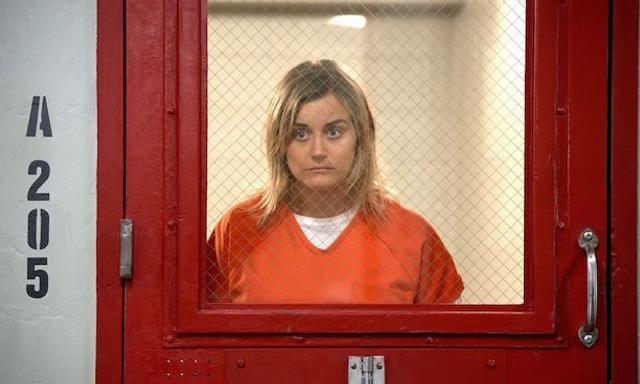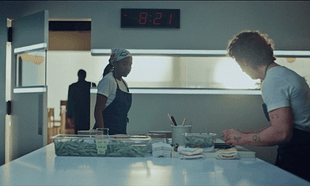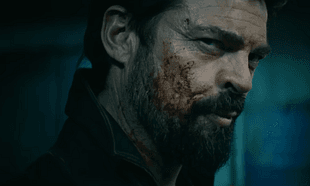**Spoilers Ahead**
In a lot of ways, you really have to give credit to Jenji Kohan and the writers of 'Orange Is The New Black' for spinning what should have been a fifteen-month prison sentence into going on six years of peak television drama and introducing characters, stories and issues that rarely get an airing, much less entire seasons built around them.
From the get-go, what's made 'Orange Is The New Black' so fascinating is that while Piper Chapman, Taylor Schilling's doe-eyed newcomer to the hard side of life, was the way in for the audience, she was sidelined almost as quickly as was necessary so that other experiences, less privileged and more real, could come to the fore. The fifth season, meanwhile, was where the straw broke and Litchfield Prison snapped, turning the riot into an act of social disobedience and getting a whole season out of maybe two weeks or so in Piper's sentence.
The sixth season opens with the inmates forced into the maximum security wing of Litchfield, where new characters are introduced, namely the rulers of C and B Block - Barbara and Carol Denning - and their lieutenants, Baddison and Daddy. While some characters from previous seasons are sidelined, particularly Sophia Burset, Lolly and Morello, it makes sense as their characters have effectively ran their course and gives the season a chance to breathe new life into what was becoming a lifeless premise.

Again, Piper's story is relatively minimal in the grand scheme of things and the new characters introduced are all shown their backstory, which informs their reasons for being there as well as their character and morality. While it's nothing new in the series, it's an effective way of quickly making an audience understand them. What's really interesting, however, is how the new environment - mainly, maximum security and the further dehumanisation that it brings - changes the established characters from the previous seasons.
For example, much of the season's overarching plot centres on the decades-long feud between Barb and Carol, of which Frieda Berlin was a central part. In previous seasons, Frieda very much played a background role and was sort of seen as a capable, if a little dull character. The opening episode kicks off with her front and centre, and the story unfolds that she had not only double-crossed the two sisters, but was preparing to double-cross just about everyone - Red, Nicky, all of the 'cookies' from the minimum-security wing - to get herself into the B Block, derisively known as 'Florida' for its elderly inmate population.
Daya, meanwhile, begins to crumble and relapses into drug abuse and attempts to bring her mother in on a drug-smuggling operation. Red, meanwhile, becomes even more hardened and loses faith both in her surrogate family and her family outside, who she feels have all but abandoned her. Blanca, meanwhile, reckons with the realisation that her prison sentence means she is unlikely to be a mother whilst Nicky faces up to her parents and their ambivalence towards her. There's also Joe Caputo, who has to contend with his own culpability in MCC's crimes, and how he can atone for them himself.
The first half of the season also focuses on the repercussions of the riot from last season, and the FBI's essential ambivalence to investigation and need to stamp out the fire quickly - leading to Taystee effectively pushed forward as the inmate responsible for Piscatella's death. The writing of the season doesn't make it clear exactly how and why it is that Taystee was singled out by the FBI, but maybe that's the point. The chaos of it all meant that someone had to be blamed, and sure enough, because Taystee was a lead negotiator in the riot and one of the most visible people involved, it falls to her.
What really sells 'Orange Is The New Black' for its seventh season is the final episode and its twist ending. In interviews since the season's release, it's clear that Schilling is gearing up for the end and is eager to move on, and it makes sense. If the final season does anything, it should come full circle and make audiences understand the depth of ambivalence for prisons and inmate treatment. Piper is released early from prison, is happily met by her brother, and even though she looks forlornly off into the distance, she's still free.

Taystee is facing a life sentence for a crime she didn't commit, and teased the possibility of taking her own life if she was sent back to prison. Blanca, meanwhile, is being transferred to an ICE facility where she'll most likely be deported. Daya is most likely going to end up strung out on heroin for the forseeable future as a means of coping with her life sentence (also for a crime she didn't commit), and Morello is most likely facing into a miscarriage if her final scene is anything to go by.

'Orange Is The New Black' begins and ends with the simple premise that the justice system in America isn't just - so it makes sense that the scales tip overwhelming in favour of Piper. That final montage may be brutal, and it may feel like a kick in the teeth for everything that's gone through in the past six seasons, but it's real - and, in a lot of ways, is why the sixth season is probably one of the best so far. It makes complete sense that it would work out like this, because it's what happens in real-life so very often.
The question that rests on what'll most likely be its final season is, what now?



















































































